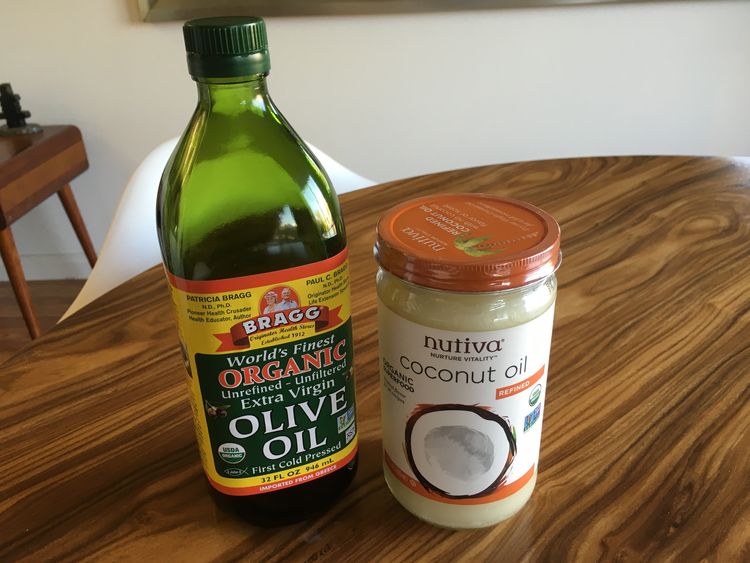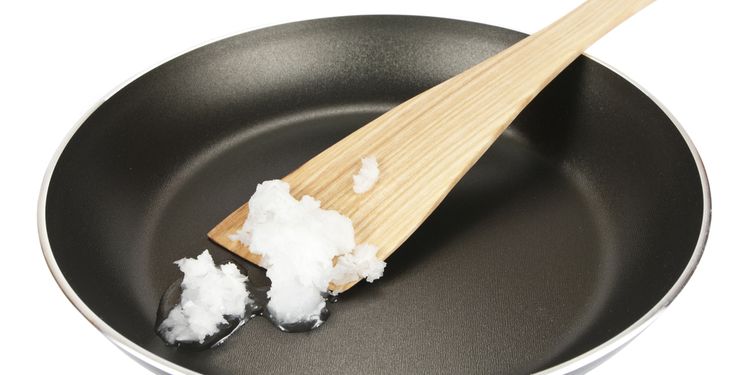Coconut Oil vs. Olive Oil: Different Oils For Different Uses

There are many different kinds of oils out there, and trying to figure out which ones to use can feel like a daunting task. For the most part though, the real choice boils down to just two that are by far the best to use on a daily basis: coconut oil and olive oil.
Coconut oil is pressed from the meat of coconuts, while olive oil is pressed from the fruit of the olive tree. Both have impressive health benefits, but they differ in important ways that govern when to use them for which purposes.
The Best Oils for Cooking
When an oil is heated, it will eventually reach its smoke point. When the oil begins to smoke, then it is beginning to decompose. This is important, because oxidization can cause the oil to become rancid and hydrogenated, immediately making it very unhealthy and carcinogenic.
Olive oil has a smoke point of 200°F, which means it’s really not good for high-heat cooking. Coconut oil, however, remains stable at high temperatures because of its healthy saturated fats, which bump its smoke point up to 350°F.

The Best Oils for Raw Use
Reaping the full health benefits from both olive and coconut oils comes from using them raw. Here’s the run-down on the benefits of each:
Olive Oil Benefits
Heart health: The monounsaturated fats in olive oil lower bad (LDL) cholesterol, raise good (HDL) cholesterol, and lower triglycerides more than any other dieting method.
Anti-inflammatory: The polyphenols in olive oil are powerful antioxidants that reduce the inflammatory response lurking behind arthritis and so many other disease conditions.
Cancer prevention: Olive oil contains such anti-cancer agents as squalene and terpenoids, along with the peroxidation-resistant lipid oleic acid.
Weight loss: For too long, people have tried to lose weight by not eating fat. As it turns out, diets rich in healthy fats (like the ones in olive oil) make you feel more satisfied. The key to making a higher-fat diet work is to keep carbohydrate intake as low as possible.
Brain function: The fatty acids in olive oil help your brain stay sharp and focused, and the antioxidants help fight the inflammation and oxidative stress that contribute to dementia and Alzheimer’s disease.
Mood control: The fatty acids in olive oil help correct hormonal imbalances and prevent neurotransmitter dysfunction, both of which contribute to depression and mood disorders.
Skin health: The healthy fats and high levels of vitamin E in olive oil keep skin hydrated and reduce the occurrence of acne, eczema, and other skin problems. And it smells great, too!
Diabetes prevention/treatment: The fats in olive oil stabilize blood sugar and regulate insulin, thereby reducing the risk of type 2 diabetes.

Coconut Oil Benefits
It’s interesting to note that coconut oil has all the same health benefits as olive oil, plus several more:
UTI/kidney/liver effects: Coconut oil’s medium-chain fatty acids (MCFAs) act as natural antibiotics that kill the bacteria that cause UTIs and kidney infections, and they also provide direct protection to the liver. Coconut water has even been used to treat kidney stones.
Boosts immune system: Coconut oil is an anti-microbial, anti-fungal, anti-bacterial, anti-fungal wonder. This is all thanks to its lauric acid content.
Energy and endurance: Because the fatty acids in coconut oil are medium-chain, they are more quickly absorbed and readily available to be used by the body and brain as fuel to keep you going.
Nutrition booster: Coconut oil helps the body more quickly absorb and use fat-soluble vitamins, calcium, and magnesium. Taking coconut oil along with omega-3 fatty acids can make the latter twice as effective.
Fight cavities and gum disease: Coconut oil pulling (gently swishing the oil in the mouth for 20 minutes and spitting it out three times per week) has been used for hundreds of years as a highly effective way to draw bacteria and other toxins that cause tooth decay and gum problems out of the mouth.
Osteoporosis prevention: Because coconut oil helps the body absorb calcium, your bones become much healthier.
Anti-aging: Coconut oil’s powerful antioxidants literally slow the aging process, mostly by helping the liver do its job and protecting it from stress.
Hair and skin: Applied directly, coconut oil can help you get rid of dandruff, and it’s also great for moisturizing and smoothing your skin.
The most natural way to get the health benefits of raw olive oil is by using it to make salad dressings. Coconut oil, on the other hand, can be used in some instances instead of dairy products. Try it in place of butter on your toast or in place of cream in your coffee. You can also just add a tablespoon or two to your favorite smoothie.
Also, both coconut and olive oils make great carrier oils for essential oil aromatherapy treatments, because they spread the essential oil over a larger surface and help it stay in contact with your skin longer.

Extra-Virgin or Refined Coconut Oil?
You will find some people who argue in favor of using refined coconut oil for cooking because it has an even higher smoke point (450°F) and doesn’t have the strong coconut flavor or aroma. That is all true, but the refining process of bleaching it and deodorizing it also turns it into an unhealthy oil by destroying most of its antioxidants and even partially hydrogenating it (meaning it will include trans fats). Those aren’t trade-offs anyone should make just to get an extra 100 degrees of cooking temperature.
The only kind of coconut oil you should use is organic, cold-pressed, extra-virgin coconut oil. If you can’t easily verify that’s what it is, then it’s not good enough for you. And if you’re really concerned about the taste of coconut coming through in your scrambled eggs, then cook with grass-fed organic ghee (a particular kind of clarified butter).

Is Your Olive Oil Even Real?
There are three kinds of olive oil but only one you should use. There’s regular or ordinary virgin olive oil, virgin olive oil, and extra-virgin olive oil. That last one, extra-virgin, is the only one you should use. It means it was cold-pressed from olives and did not use any kind of chemical or high-heat processing technique. It’s the only one that’s going to have the maximum nutrient content you want to get.
You have to be careful with olive oil, because there are many imposters on the shelves of your grocery store. Something like 70% of imported “extra-virgin” olive oils have been diluted with low-grade, unhealthy oils.
You also want it to be unfiltered. Avoid anything that says “light” or “extra-light” because it just means it has been more highly processed, which never makes any food better for you. It’s playing on the still widely held misconception that all fats are bad, which by now (if you’ve been reading articles on this site) you know is not true.
Finally, never buy olive oil that’s in a clear bottle, because sunlight can start decomposing it. Buy it in dark glass bottles and store it in a cool, dark place.
Summary
Extra-virgin olive oil and extra-virgin coconut oil are both best used raw. Olive oil makes a great base for salad dressings. Coconut oil can be applied directly to hair and skin, used for oil pulling, as butter for your toast, cream for your coffee, and added to smoothies.
When it comes down to high-temperature cooking, rather than going with unhealthy refined versions of either oil, the best option is to go with organic, grass-fed ghee.
